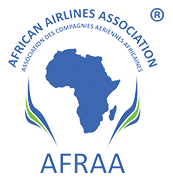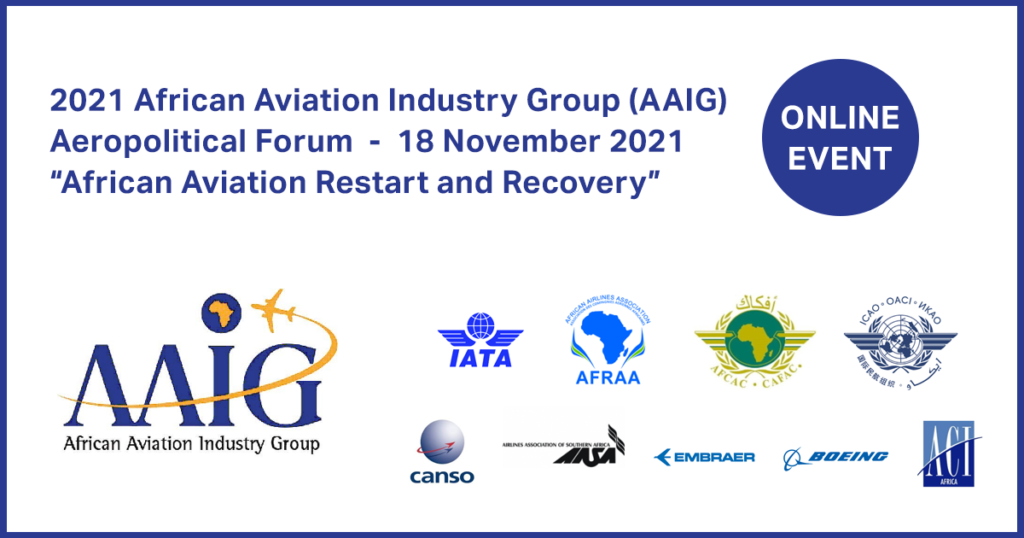La 53ème AGA de l’AFRAA établit une feuille de route pour la transformation et le développement économique du transport aérien en Afrique
17 novembre 2021, Nairobi, Kenya :
Lors de la 53ème Assemblée générale annuelle et Sommet de l’AFRAA qui s’est achevée aujourd’hui, les dirigeants et décideurs du transport aérien ont établi une feuille de route pour la transformation et le développement économique du transport aérien en Afrique. L’événement s’est déroulé sous le parrainage du gouvernement angolais sous le thème :«Chemin vers l’écosystème de voyage résilient de l’Afrique».
L’AGA de l’AFRAA est le plus grand rassemblement des PDG des compagnies aériennes africaines et des dirigeants de l’aviation de haut niveau en Afrique et dans le monde. L’événement de cette année a été parrainé par TAAG Angola Airlines en format virtuel. L’Assemblée a réuni plus de 400 délégués de 51 nationalités à travers le monde, comprenant des décideurs et des leaders de l’aviation. Des associations internationales et régionales de transport aérien, notamment l’Union africaine, l’IATA, l’OACI, l’AFCAC et l’ALTA, étaient également représentées lors de l’événement.
L’invité d’honneur, l’honorable Ricardo de Abreu, ministre des transports de la République d’Angola, a déclaré dans son discours d’ouverture que : « la présente AGA est l’occasion idéale pour se pencher sur l’avenir de l’aviation africaine et renforcer l’engagement des parties prenantes afin de permettre à tous les secteurs de nos économies de bénéficier des multiples avantages. L’échec n’est pas une option, ensemble nous réussirons. Il a souligné les diverses mesures et initiatives prises par le gouvernement angolais pour améliorer le secteur de l’aviation et faire de Luanda un hub efficace».
M. Abdérahmane Berthé, Secrétaire général de l’AFRAA, a déclaré en substance que : « L’Assemblée de cette année nous donne l’occasion de repenser notre secteur et de développer une perspective résiliente et durable pour l’industrie du transport aérien. L’AFRAA demeurera fidèle à sa mission qui est de promouvoir et de servir les compagnies aériennes africaines et de défendre le secteur aérien africain – De meilleurs cieux pour l’Afrique – qui reste le pilier de toutes nos actions».
En ce qui concerne la reprise, M. Berthé a souligné que les ingrédients d’un redémarrage réussi sont les suivants : les mesures pour des voyages en sécurité, la suppression des restrictions aux voyages, le soutien financier aux compagnies aériennes, la technologie pour façonner la « nouvelle normalité », la réinvention et la redéfinition des modèles d’affaires des compagnies aériennes, la coopération entre les compagnies aériennes africaines et la confiance des passagers.
Dans son allocution, le Président de l’AFRAA pour 2021, M. Rui Carreira, a déclaré que : « La présente AGA offre un forum unique aux compagnies aériennes et aux parties prenantes pour discuter, partager des idées et explorer les solutions qui peuvent être mises en œuvre pour la rapide restauration du secteur aérien. Les compagnies aériennes africaines doivent profiter de cette occasion pour sortir, plus fortes et plus résistantes, de la crise afin de relever les défis du secteur. La coopération et la collaboration entre les compagnies aériennes africaines par le biais d’initiatives telles que la coordination des réseaux et la maîtrise conjointe des coûts sont autant d’initiatives qui permettront aux compagnies aériennes de surmonter rapidement les effets de la pandémie. »
Tendances positives vers la reprise
Une analyse approfondie des perspectives de l’industrie faite au cours de l’Assemblée a indiqué que les compagnies aériennes sont sur une trajectoire positive de reprise, étant donné que les compagnies aériennes africaines avaient rouvert 81,3 % de leurs routes internationales en octobre 2021 et que la reprise en Afrique et au Moyen-Orient a été plus harmonieuse et plus constante qu’en Europe et en Asie. Cependant en Afrique, la croissance sous-régionale est variée et guidée par des dynamiques de marché différentes.
L’analyse a en outre révélé que les compagnies aériennes africaines ont augmenté leur flotte régionale depuis 2020, ce qui permet une pénétration plus profonde du marché et un meilleur flux. La capacité de fret africaine a augmenté de 33 % depuis 2019 et les coefficients de remplissage de ce dernier se sont améliorés de 9 % par rapport aux niveaux d’avant la pandémie. L’aube de la reprise est un moment décisif pour redéfinir les plans stratégiques des cinq prochaines années.
Résolutions relative au secteur
L’Assemblée s’est terminée par l’adoption de trois (3) résolutions pour faire avancer la cause de l’aviation africaine :
- Résolution relative à la réouverture protégée des frontières
Reconnaissant que la réouverture sûre des frontières de manière harmonisée est essentielle pour le redémarrage efficace de l’aviation africaine, l’Assemblée a demandé aux gouvernements africains de supprimer les restrictions aux frontières et d’ouvrir leurs marchés pour la relance du secteur avec le concours des normes et des documents d’orientation du plan de redémarrage du secteur. L’Assemblée a par ailleurs lancé un appel aux gouvernements africains pour qu’ils accélèrent le déploiement rapide des vaccins sur le continent afin de faciliter le redémarrage des économies et du transport aérien.
2. Résolution relative à l’appui financier aux compagnies aériennes
Reconnaissant l’importance de l’appui financier pour la relance du secteur du transport aérien, l’Assemblée a lancé un appel aux gouvernements africains afin qu’ils accordent l’appui et l’assistance financiers tant nécessaires pour les compagnies aériennes africaines et pour le secteur aérien africain en général.
3. Résolution relative à l’approche conceptuelle de laboratoire afin de réaliser la durabilité des compagnies aériennes africaines
Reconnaissant l’importance d’aborder la question de la durabilité et de la compétitivité du transport aérien en Afrique, l’Assemblée a préconisé un laboratoire réunissant toutes les parties prenantes concernées pour une opportunité de transformation en vue du développement économique du transport aérien en Afrique. Le Secrétariat de l’AFRAA, en concertation avec la Commission de l’Union Africaine (CUA), la Commission Africaine de l’Aviation Civile (AFCAC) et le Groupe de l’industrie aérienne africaine (AAIG), organisera le laboratoire avant la fin du mois de mars 2022.
Les officiels de l’Association pour 2022
La 53ème AGA de l’AFRAA a élu M. Ibrahima Kane, Directeur Général d’Air Sénégal, comme Président de l’Association pour l’exercice 2022. Le capitaine Pascal Kasongo Mwema, directeur général de Congo Airways, Mme Yvonne Makolo, directrice générale de RwandAir, et M. Mohamed Khalifa Biyah, directeur général de Mauritania Airlines, ont été réélus respectivement président, premier et deuxième vice-présidents pour le même exercice.
Hôte de la 54ème AGA
Air Sénégal accueillera la 54ème Assemblée Générale Annuelle qui se tiendra en novembre 2022 à Dakar, Sénégal.
FIN
À propos de l’AFRAA
L’Association des compagnies aériennes africaines, également connue sous le sigle AFRAA, est une association professionnelle de compagnies aériennes des États membres de l’Union africaine (UA). Fondée à Accra, au Ghana en avril 1968 et ayant son siège à Nairobi, Kenya. L’AFRAA a pour mission de promouvoir et de servir les compagnies aériennes africaines et de défendre l’industrie aérienne africaine. L’Association a la vision d’un secteur du transport aérien durable, interconnecté et abordable en Afrique, où les compagnies aériennes africaines deviennent des acteurs clés et des moteurs du développement économique africain.
Les 46 compagnies aériennes membres de l’AFRAA couvrent l’ensemble du continent et comprennent tous les grands opérateurs intercontinentaux africains. Les membres de l’Association représentent plus de 85% de tout le trafic international transporté par les compagnies aériennes africaines.
À propos de TAAG Angola
TAAG Angola Airlines S.A (en portugais : TAAG Linhas Aéreas de Angola S.A.) est la compagnie aérienne étatique et le transporteur national de l’Angola. Basée à Luanda, la compagnie aérienne exploite une flotte mixte de Boeing et de Havilland Dash 8 Q400 pour des services domestiques, des services moyen-courriers en Afrique et des services long-courriers vers le Brésil, le Cuba et le Portugal. Au départ la compagnie aérienne a été créée, en 1938 par le gouvernement sous le nom de DTA, Divisão dos Transportes Aéreos, puis rebaptisée, en 1973 TAAG Angola Airlines et a obtenu, en 1975, le statut de transporteur national. La TAAG est actuellement membre de l’Association des compagnies aériennes africaines et de l’Association internationale du transport aérien. Elle entretient des partenariats commerciaux avec Kenya Airways, South African Airways, LAM, Royal Air Maroc, Air France, KLM et Lufthansa et Brussels Airlines.









